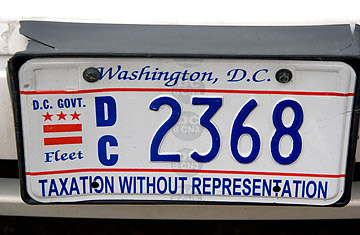
A Washington D.C. license plate
You may be a U.S. citizen, pay federal taxes, even serve in the military. But if you live in the nation's capital, as far as Congress is concerned, you might as well not exist.
The District of Columbia has never had its own Senator or Representative, despite a population (nearly 600,000) larger than Wyoming's. That curious disenfranchisement may soon change, however, as a bill advances through Congress that would finally give D.C. a House member. On Feb. 24, the Senate voted to allow debate on the plan, which would expand the House to 437 members, its first enlargement in nearly 100 years. The bill would also grant Utah another vote until the next reapportionment in 2012, maintaining the body's partisan balance as D.C.'s addition would almost certainly be a Democrat and Utah's a Republican. (See pictures from 2008's historic Election Day.)
Always an odd federal orphan, the District of Columbia has struggled to wean itself from congressional control since it was first cobbled together in 1790. Residents could vote for House members in neighboring Virginia and Maryland until 1801, but city leaders were originally appointed by the President. The city enjoyed some self-rule for much of the 19th century, but most of it was stripped away in 1874. Voters couldn't participate in presidential elections at all until the 23rd Amendment was ratified in 1963. After persistent lobbying by residents — their neighbors, after all — lawmakers passed the Home Rule Act of 1973, allowing voters to directly elect the mayor and city council. But Congress still acts as the District's slightly distant parent, wielding final budget control and reviewing all local laws. It nixed efforts to impose a "commuter tax" on Maryland and Virginia residents, for example, and banned buildings higher than the Capitol dome.
In 1971 Congress allowed D.C. to send a nonvoting delegate to the House of Representatives (a position currently filled by the fiery advocate Eleanor Holmes Norton), and continued pressure led to a 1978 constitutional amendment that would have given the District a full vote in Congress. But the amendment fizzled, winning support in fewer than half the states needed. In 1980 District voters even approved their own constitution — for a 51st state to be called New Columbia. That plan went nowhere. (See pictures of voting machines.)
Amid mounting frustration, the District in 2000 revived a Revolutionary rallying cry, emblazoning the phrase "taxation without representation" on license plates at the suggestion of a fed-up D.C. radio talk-show listener. (They're now the default license option, though neutral plates are issued on request.) Bill Clinton swiftly added the plates to his presidential limousine, though one of George W. Bush's first official acts was to remove them. The protest plates have not returned to President Barack Obama's ride, and some locals are growing impatient. "[It's] just something that the President hasn't gotten to yet," a White House spokesman recently insisted.
The main argument against granting D.C. a congressional vote is a simple one: it's not a state. Article I, Section 2 of the Constitution says Representatives are to be chosen "by the people of the several states." "The Constitution of the United States could not be clearer," Arizona Senator Jon Kyl recently said on the Senate floor. And while his opposition may have as much to do with politics as law — Republicans are skittish about a slippery slope that would lead to U.S. Senators from D.C., a Democratic stronghold — the definition of a state is surprisingly hard to pin down. While the U.S. flag has only 50 stars, D.C. is considered a state in other legal references, such as the Constitution's provision that lets Congress regulate interstate commerce. (See 50 authentic American travel experiences.)
Backers of the current effort have been heartened by the apparent swell of interest in the idea, especially since a similar measure stalled in the Senate two years ago. And crucially, Obama supports the idea, unlike his predecessor. Yet the bill faces an uphill climb, even if it gets to the President's desk. Long legal challenges are a certainty, and many observers — including the respected Congressional Research Service — think the Supreme Court may consider the law an overreach. "Under that power, they could create 20 seats for military areas. Or they could give 10 seats to Puerto Rico," George Washington University law professor Jonathan Turley told Politico. And the President does have other things on his plate. Despite his support, Obama recently indicated he may not go to bat for the idea, telling the Washington Post his legislative agenda is already "chock-full."
It seems almost inevitable that somehow, D.C. residents will eventually get a say on Capitol Hill. Until then, those rebellious license plates will be around for a while.
